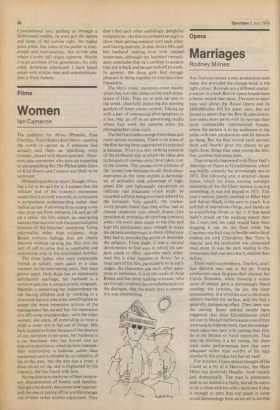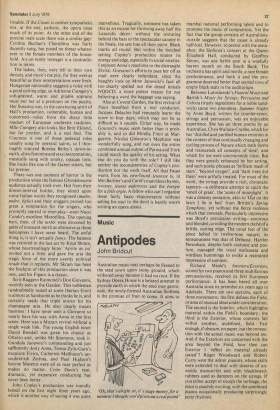Opera
Marriages
Rodney Milnes
Any fool can mount a new production (and many do) provided the cheque book is the right colour. Revivals are a different matter, a matter in which British opera houses have a better record than most. The pure in heart may wail about the Royal Opera and its £600,000-plus bill for guest stars, but are forced to admit that the Bow St administration takes more pains with its revivals than most comparable international houses, where the pattern is to lay audiences in the aisles with new productions and let revivals go hang. But the first revival (and second, third and fourth) gives the chance to get right those things that went wrong the first, fine, careless rapturous time.
That certainly happened with Peter Hall's Marriage of Figaro at Glyndebourne, which was boldly, uneasily but promisingly new in 1973. The following year it attained classic status, which for those nursing nostalgic memories of the old Ebert version is saying something. It was not played in 1975. This year's revival, jointly credited to Peter Hall and Adrian Slack, is less sure in touch. It is still full of marvellous things, and builds up to a scarifying climax in Act 3: if that band hadn't struck up the wedding march then the Count and his valet would have been slogging it out on the floor while the Countess was half way to Seville and a life of endless sin with Cherubino. But 'Ecco la marcia' and the revolution was postponed once more. It was the path leading to this crossroads that was less clearly defined than before.
There were two problems. The first, and I fear decisive one, was in the pit. Young conductors must be given their chances but Calvin Simmons, while showing a sound sense of tempo, gave a distressingly bland reading; the lyricism, the joy, the sheer sensuousness, in a word the love in the music seldom reached the surface, and this had a generally dampening effect. Then there was the casting. Some unkind people have suggested that since Glyndebourne could sell out its Mozart performances even if they were sung by hippopotami, then the management takes less care with casting than they do in the Strauss or Verdi repertoire. That may be pitching it a bit strong, but there were some performances here that were adequate rather than worthy of the high standards this production has set itself.
For instance, I have always thought of the Count as a bit of a Harrovian, but Hans Helm was positively Oundle—both vocally and dramatically. The man is sometimes seen as an insensitive bully, but all he wants to do is sleep with his wife's maid and if that is enough to earn him top place in some social demonology then we are all in terrible trouble. If the Count is neither sympathetic nor, at the end, pathetic, the opera loses much of its point. At the other end of the porcine male scale there was a similar gap: Cynthia Buchan's Cherubino was fairly decently sung, but posed no threat whatsoever to the female members of the household. An un-randy teenager is a contradiction in terms.
The ladies, then, were left to their own devices, and more's the pity, for they were as beautiful as their interpretations were fresh.
Hungarian nationality suggests a voice with a good cutting edge, so Adrienne Csengery's soft-grained, warm and pliable soprano must put her at a premium on the puszta. Her Susanna was, in the convincing spirit of Hall's production, vulnerable, human and concerned—miles from the sharp little madam of European soubrette tradition.
Mlle Csengery also looks like Britt Ekland, but far prettier, and is a real find. The Countess is one of those pedestal roles usually sung by operatic saints, so I thoroughly enjoyed Bozena Betley's down-toearth, ultra-feminineand sexy interpretation, musically sung with smoky, opaque tone. She looks like one of the Gabor sisters, but far prettier.
There was one moment of horror in the production when the famous Glyndebourne audience actually took over. Hot from their dinner-interval bottles, they seized upon some Italian words they recognised (madre, padre, figlio) and their sniggers proved too great a temptation for the singers, who promptly started to over-play—even Nucci Condo's excellent Marcellina. The opening bars, then, of the sextet were drowned by gales of innocent mirth as obtrusive as those helicopters I have never heard. The awful thing is, it isn't actually funny. The balance was restored in the last act by Knut Skram, whose heartrendingly bitter 'Aprite un po' invited not a titter and gave the aria the tragic force of the more overtly political tirade that it replaces. Mr Skram has been the linchpin of this production since it was new, and his Figaro is a classic.
So is Ruggero Raimondi's Don Giovanni, recently seen at the Garden. This nobleman (undoubtedly raised at some Iberian Eton) is almost as handsome as he thinks he is, and certainly needs that triple mirror for his champagne aria. He also clearly means business: I have never seen a Giovanni so nearly have his way with Anna in the first scene. Here was a Mozart revival without a single weak link. The young English tenor David Rendall was given his chance as Ottavio and, unlike Mr Simmons, took it.
Gundula Janowitz's commanding and just sufficiently dotty Anna, Teresa Zylis-Gara's exquisite Elvira, Catherine Malfitano's un soubrettish Zerlina, and Paul Hudson's bovine Masetto were all as near perfect as makes no matter. Colin Davis's taut, dramatic, yet expansive conducting has never been better.
John Copley's production was roundly booed on the first night three years ago, which is another way of saying it was quite marvellous. Tragically, someone has taken this as an excuse for throwing away half the Lazaridis decor: without the texturing behind the bars or the spectacular canopy in the finale, the sets lose all their point. Black marks all round. But within the botched setting Copley's production retains its energy and edge, especially in social niceties. I enjoyed Anna's reactions to the distraught Elvira: Giovanni's efforts to pass her off as mad were clearly redundant, since the haughty look on Mme Janowitz's face all too clearly spelled out the dread initials NQOCD, a more potent reason for not believing a word the baggage was saying.
Also at Covent Garden, the first revival of Faust benefited from a real conductor. Jacques Delacote had reputedly learnt the score in four days, which may not be as difficult as it sounds. Either way, he made Gounod's music seem better than it probably is, and so did Mirella Freni as Marguerite. Nicolai Ghiaurov's Mephisto was wonderfully sung, and not even the entire combined annual output of Parma and York could match the quality of his acting. What else do you do with the role? I still like neither the inconsistencies of Copley's production nor the work itself. All that Faust wants from his new-found feunesse is, in Mm Barbier's and Carre's matchless rhymes, ivresses, leunes maitresses and the energie for a folk orgie. A fellow who can't organise these fairly basic requirements without selling his soul to the devil is hardly worth writing an opera about.



































 Previous page
Previous page